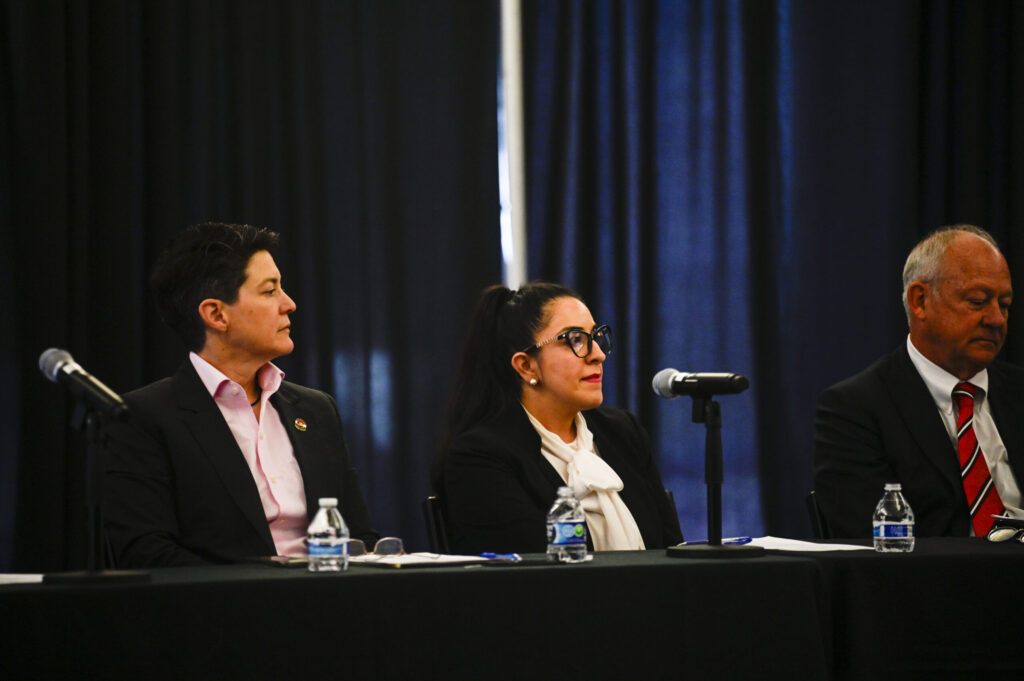Mesa County’s top judge denies responsibility for constitutional violations

The chief judge of Mesa County admitted he was the administrative leader of the district court when police arrested a man seven times based on an expired protection order, but denied he was responsible for the repeated violation of the man’s constitutional rights.
Brian J. Flynn filed a response on Monday in U.S. District Court to the lawsuit of Elson Foster. Although Flynn acknowledged Foster was arrested repeatedly, that the protection order Foster supposedly violated was no longer in effect, and that judicial employees were responsible for manually entering protection orders into the computer system, the chief judge argued Foster had no case against him.
“Defendant acted in good faith and his conduct was objectively reasonable,” wrote lawyers for the Colorado Attorney General’s Office, which is defending Flynn.
Foster was subject to a criminal protection order, which directs people to stay away from victims or witnesses, prohibits consumption of alcohol and controlled substances, bars firearm possession, or imposes other conditions necessary to protect the safety of victims or witnesses. The protection order was no longer in effect when Foster completed parole in July 2018.
But the 21st Judicial District, Foster alleged, has a practice of not removing protection orders that expire upon the early completion of parole. As a result, police were arresting Foster unlawfully. An arrest based on the lack of probable cause amounts to a constitutional violation under the Fourth Amendment.
Foster charged that Flynn knew about the unconstitutional practice and failed to address it. His complaint cited multiple emails from the public defender’s office to Flynn, which told the chief judge that “we continue to get cases every few months where someone who discharged parole is arrested” for an expired protection order.
Flynn did not deny receiving the emails in his court response and said the content “speaks for itself.”
Last month, a federal judge denied Flynn’s request to dismiss the claims against him. The ruling was based on a recommendation from U.S. Magistrate Judge S. Kato Crews, who determined Flynn should not receive immunity because he knew about the danger of unlawful arrests and “stayed the course.”
“In the Court’s view, the wrongfulness of Judge Flynn’s alleged actions is self-evident,” Crews wrote in his June 18 recommendation. “Judge Flynn is not only a licensed attorney, but he is also a chief judicial officer in the Colorado court system. It should have been clear to any reasonable official, particularly a chief judge, that maintaining a policy which results in arrests lacking probable cause based on expired protection orders, violates those individuals’ Fourth Amendment Due Process rights.”
A person familiar with criminal protection orders in the state of Colorado, speaking on condition of anonymity, said they had not heard of any problems as severe as the alleged circumstances in Mesa County. They said that while there is no automated system to update protection orders in the case of early release, a protection order is an order of the court, and therefore is the court’s responsibility to handle.
“I personally believe it’s the chief judge’s responsibility to work with all of the judges in the district to create policies and procedures to avoid bad impacts from happening,” the person said.
Multiple district attorneys’ offices said they had no way of tracking arrests based on expired protection orders, and were unaware of specific cases where such arrests had occurred.
“If I got word that someone was arrested on a violation of a protection order and I found out that protection order had been vacated, that would get my attention. That’s a wrongful arrest,” said Heidi McCollum, the Fifth Judicial District Attorney for Clear Creek, Lake, Eagle and Summit counties. “That would absolutely grab my attention.”
In Mesa County, the prosecutor’s office was copied on the emails to Flynn and also communicated to the district court about the issue, District Attorney Daniel P. Rubinstein told Colorado Politics last month.
Foster spent several occasions in jail as the result of his wrongful arrests, until his cases were dismissed.
Flynn told the federal court in his response to Foster’s lawsuit that Foster had failed to state a claim against him, that some damages to Foster may have been caused by “intervening or superseding acts of third parties,” and that Flynn had not caused harms to Foster.
“To the extent that the public is interested that we are not expending resources arresting or pursuing cases which are faulty, yes, it’s not a good use of resources,” said the person familiar with protection orders. “And it has a negative impact on the person who is arrested who should not have been arrested.”
The case is Foster v. Flynn.














